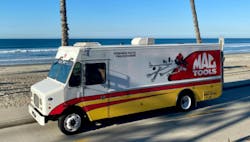Stephen Fultz, a Mac Tools distributor based out of California, spent around 20 years as an automotive technician in the independent world, working mostly on custom builds and European cars. For some time, he had been thinking about switching careers, and with his father’s passing it became difficult for him to continue in automotive.
“I just wasn’t happy anymore,” Fultz says. “I had been looking at the tool industry for a while as a switch, but it wasn’t until my father passed that I [thought], this isn’t right for me anymore.”
The passion he’d had as a technician had run its course, and it was time for him to move on. In December 2021, Fultz officially made the switch over.
From tech to distributor
Understanding a tool’s uses and how it can fulfill a technician’s needs is crucial when promoting products. Fultz's background as an automotive technician gives him an edge when it comes to selling tools to his customers. He’s seen both sides of the industry in his career, and now as a distributor his eyes are open to the intricacies of how it operates.
“I bought off of tool trucks for almost two decades and saw how it works on that side, and now I [see] how it operates from the tool side instead of the [technician] side,” says Fultz. “There’s a lot that goes on behind the scenes that you don’t ever realize.”
A technician mindset has helped Fultz interact with his customers, giving them reassurance that he knows what he’s talking about, but more than that it helps him decide what to stock on his truck. For the most part, Fultz can anticipate what tools or equipment his customers will need based on what kind of repairs they perform. Still, as with anything, there’s always more to learn and countless opportunities to expand his knowledge.
“If I’m talking to a customer and they start talking about a tool that I’ve either never heard of or forgotten about, I will, at that point, decide if it’s something I should have on my truck.”
By listening to his customers’ needs, Fultz is able to evolve his business alongside them, branching out where he needs to so that when questions arise, he’ll be able to answer them.
Tips for success
Listen to your gut
For people who are considering a career change into tool distribution, or for anyone just starting out, Fultz advises them to go with whatever gut feeling they’re having. It might seem daunting to change careers, especially if your story is anything like Fultz’s and you’ve spent two decades doing something else, but you’ll never know the outcome if you don’t try.
Keep the old along with the new
In his route through Oceanside, Carlsbad, and Encinitas, California, Fultz stops at dealerships, independent shops, and some aviation service stations. For the dealerships he services, they tend to purchase a lot of hand tools for general maintenance on vehicles that aren’t necessarily that old.
“They have to focus on getting the cars in and out as quickly as they can,” Fultz says. “A lot of the dealerships will supply the diagnostic tools for them.”
On the flip side, independent repair shops might see a range of vehicles from old to new so they need the proper tools to get the job done. To meet their unique demands, Fultz offers both options of products that will service the new cars–whether that be diagnostic or something more specific like ADAS-related equipment–and keep older cars on the road. He reads his routes, getting to know them well enough that he knows what tools will sell where.
Stay consistent
In this industry, staying on top of things is part of what makes you successful. By keeping himself available to his customers, even if it’s just a phone call, Fultz ensures that they know he’s there for them and he values their business.
“I make sure that I have really good customer service and that I’m at the shops every week,” explains Fultz. “I make my presence known to them.”
As for the future, Fultz would like to add a second truck and expand his customer base. With a second truck, he could offer ride-alongs for people interested in getting their foot in the door of the industry.
“I could be that stepping stone [for them],” says Fultz. “They could try it out… and see if it’s something they could do full time on their own.”
Fun Facts:
- Music for the road: Anything from Johnny Cash, to slayer, to new music from other countries and cultures.
- Never leave home without: A good attitude and a smile.
- Tactics for getting customers on the truck: A candy bowl, energy drinks and water, and constantly changing the layout of tools.
About the Author
Elli Carder
Assistant Editor | PTEN & Professional Distributor
Elli Carder is an assistant editor for Endeavor Business Media's Vehicle Repair Group. With a background in professional and creative writing, Carder helps edit for both Professional Tools and Equipment News (PTEN) and Professional Distributor magazines, as well as VehicleServicePros.com.
Don't miss Carder's next article. Sign up for PTEN or Professional Distributor's weekly newsletter.

